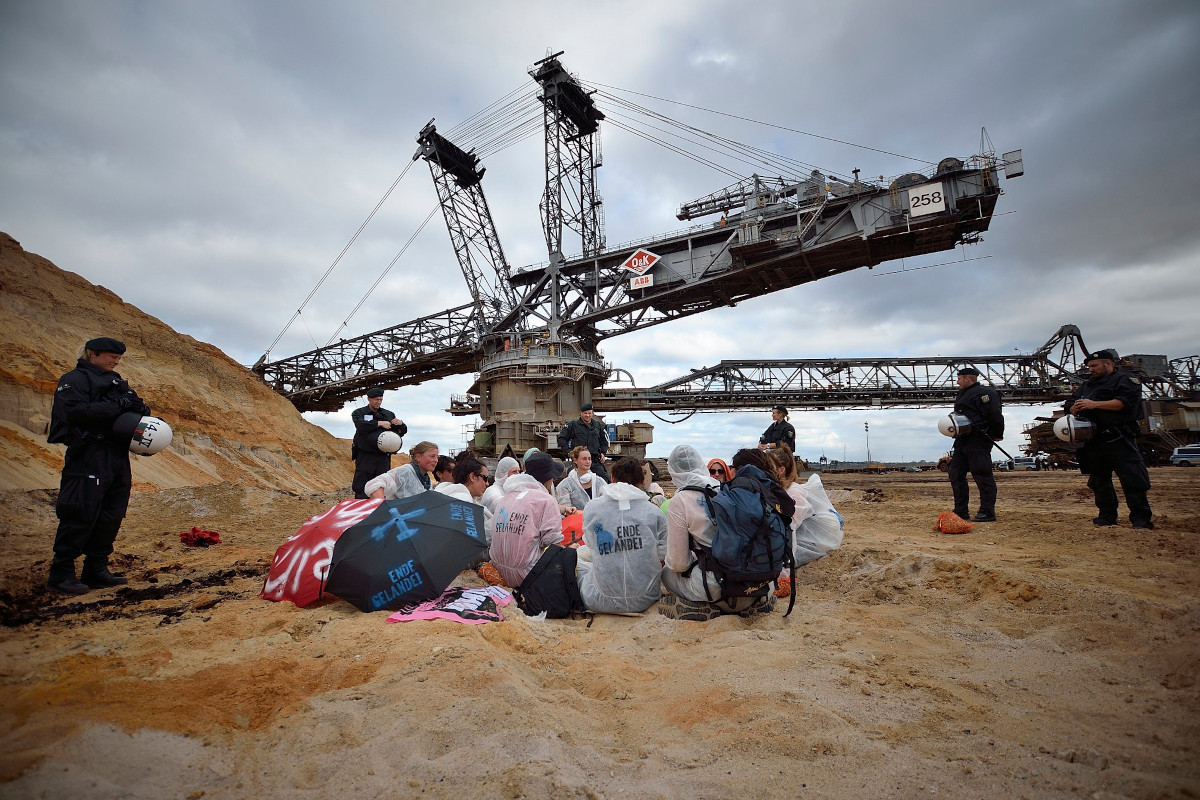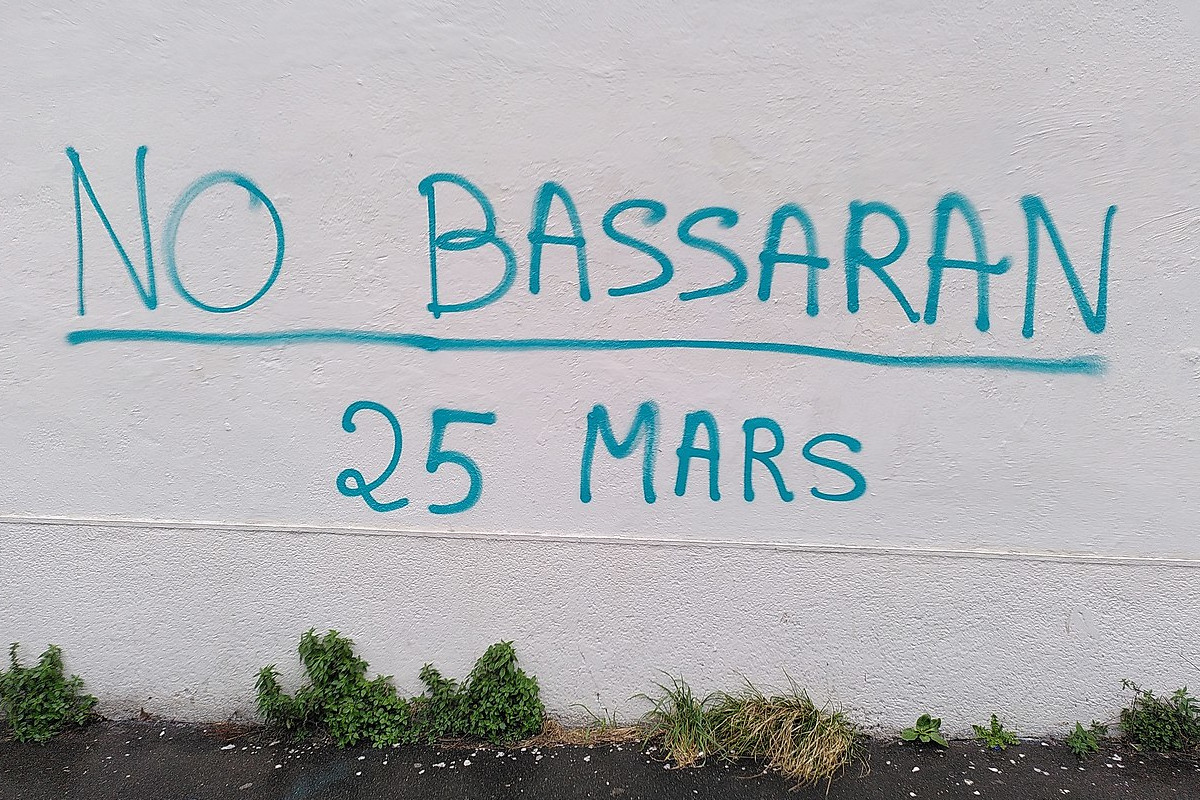Spain: Terrorism charges against protesters undermine "international human rights and democratic standards"
Topic
Country/Region
27 February 2024
A letter signed by 20 organisations from across Europe, including Statewatch, calls for the dropping of terrorism charges filed by the Spanish authorities against 12 protesters. The 12 face the charges for organising a blockade of Barcelona's El Prat airport and the motorway at La Jonquera, near the border with France, in protest at the jailing of Catalan independence leaders. "The misuse of the accusation of terrorism is unjustifiable," the letter says. It goes on to say that it undermines "international human rights and democratic standards" and "has a chilling effect on civic engagement."
Support our work: become a Friend of Statewatch from as little as £1/€1 per month.

Image: A Catalan independence march in Barcelona, September 2022. Image: Xevi V, CC BY-NC-ND 2.0
The letter was initiated and coordinated by the European Civic Forum.
Joint letter: Solidarity for Activists in Catalonia Accused of Terrorism
We, the undersigned civil society organisations, express our urgent concerns regarding the restrictions on the right to peaceful assembly in Spain and call on the authorities to protect fundamental freedoms. Recent restrictive incidents against Catalan activists accusing them of terrorism undermine the country’s commitments to international human rights standards and European Union Law.
In November 2023, after 4 years of judicial investigation veiled in secrecy, the Spanish National Court announced that 12 people are under investigation for terrorism in connection with their alleged participation in the activities of the Tsunami Democratic movement. The actions considered as “terrorism” relate to peoples’ mobilisation and protests in 2019 in areas such as the Barcelona-Prat airport and La Jonquera in Catalonia, the latter being inspired by the 2019–2020 Hong Kong protests for democracy. People protested against the Spanish Supreme Court’s conviction of the Catalan independence leaders to prison terms ranging from nine to thirteen years for organised actions linked to the Independence of Catalonia between September and October 2017. The UN Working Group on Arbitrary Detentions and the Council of Europe had already asked for the release of the leaders, and numerous Spanish and international human rights organisations had expressed concern over their imprisonment and the sentence, such as Amnesty International, Front Line Defenders and the World Organisation Against Torture. International observers of the trial had pointed out what they consider as a number of irregularities in the process that lead to suspects of politicisation of the trial.
Freedom of assembly, including the right to organise peaceful protests, is recognised and protected by international, EU and national law. According to international law peaceful assemblies can in some cases be inherently or deliberately disruptive and require a significant degree of toleration. Hence, collective non-violent civil disobedience and direct action campaigns are covered by the freedom of assembly. The recent accusations and investigations not only contravene these international human rights standards but also create a chilling effect on civic engagement. Furthermore, over the past decade, in most European countries, anti-terrorist legislation has been amended to broaden the definition of terrorism, including legal expressions of dissent, such as non-violent protests. The misuse of the accusation of terrorism is unjustifiable, since it is based in a framework of criminal exceptionalism, which is contrary to the principles established under the rule of law.
These investigations are not isolated incidents but part of a wider trend of restrictions on the right to peaceful assembly and right to protest. In recent years, Spain and several other European countries, such as France, the UK and Italy, have passed legislation restricting the right to peaceful assembly and toughening sanctions related to assemblies. Several human rights organisations and international institutions, including the European Union Agency for Fundamental Rights, the Council of Europe and the OSCE, have raised concerns about the developments in Europe with regards to shrinking civic space. The 2023 report by the CIVICUS Monitor, rating the state of civic space globally, reports that the overall country ratings in the region have worsened. According to the report, intimidation, detention of protesters and disruption of protests were among the top five violations in Europe. Moreover, people expressing their fundamental rights of assembly face violations such as restrictive laws, police violence, preventive detention, harsher penalties and increased surveillance.
The right to peaceful assembly is a cornerstone of democratic societies, enshrined in both national, European and international law. It is a fundamental right that allows people to express their opinions and engage in public discourse without fear of repression. This is why the decision taken by the Spanish Court to refer 12 people for trial on terrorism charges because of their alleged participation in the Tsunami movement do not only undermine the international human rights and democratic standards that we collectively uphold, but also has a chilling effect on civic engagement, silencing the vibrant diversity of voices that form the foundation of a rights-based society. In solidarity with the Catalan individuals facing the accusations, we call for the immediate dropping of the charges of terrorism. State authorities have the duty to protect and facilitate fundamental rights, not stifle them.
Initiated by
European Civic Forum (ECF)
Signed by
Alternative Informatics Association / Alternatif Bilişim, Turkey (AiA)
Amnesty International
Arci – Italy
Aspiration
CIVICUS – World Alliance for Citizen Participation
Civil Society Advocates
Civil society initative Glas ljudstva
European Democratic Lawyers / Avocat.es Européen.nes Démocrates (AED)
European House Budapest
European Language Equality Network (ELEN)
European Sex Workers Rights Alliance
Headquarters of the movement (HOTM)
Ligue des droits de l’Homme (LDH)
Network for Police Monitoring (Netpol)
No Somos Delito
PIC – Legal Center for the Protection of Human Rights and the Environment
Statewatch
The Irish Council for Civil Liberties
Unrepresented Nations and Peoples Organisation
World Organisation Against Torture (OMCT)
Our work is only possible with your support.
Become a Friend of Statewatch from as little as £1/€1 per month.
Further reading

Environmental activism under the EU counter-terror microscope
Next week, EU and member state officials will discuss “the role of climate change and environmental concerns in violent extremist and terrorist radicalisation.” A discussion paper for the meeting, obtained by Statewatch, considers the threat posed by “violent left-wing and anarchist extremism” – a heading under which a number of prominent environmental protest groups are mentioned. The inclusion of peaceful but disruptive groups in the paper may legitimate further police surveillance and infiltration, legal harassment and government crackdowns – a problem identified as “a major threat to human rights and democracy” by a UN Special Rapporteur.

EU: Hamas ban plan sparks concerns of crackdown on pro-Palestinian action
A Franco-German-Italian plan setting out proposals to counter the activities of Hamas at both EU and global level has raised concerns that governments may use it as a justification for further attacks on pro-Palestinian protest and campaigning. The document outlines strategies ranging from restricting resources to banning support networks.

French government steps up repression after bloody battle of Sainte-Soline
In the aftermath of the heavy repression of activists protesting against the construction of industrial water storage basins in France on 25 March, two protesters are still in critical condition in hospital. Meanwhile, interior minister Gérald Darmanin announced heavy measures to be taken against the organisers of the mass demonstration in Sainte-Soline and even threatened to take steps against a renowned human rights organisation.
Spotted an error? If you've spotted a problem with this page, just click once to let us know.
